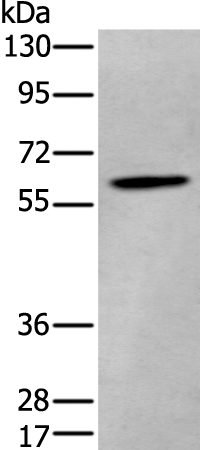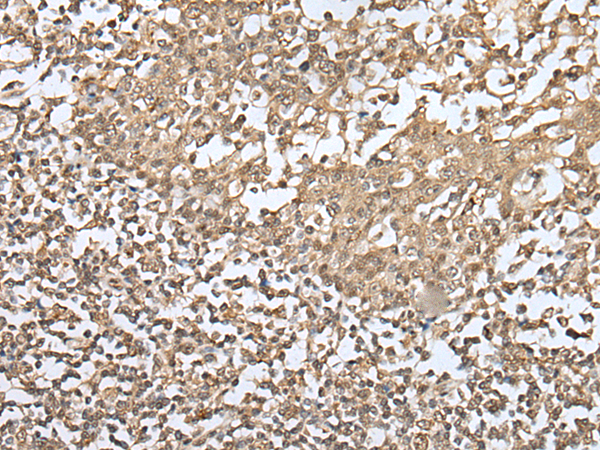

| WB | 咨询技术 | Human,Mouse,Rat |
| IF | 咨询技术 | Human,Mouse,Rat |
| IHC | 1/25-1/100 | Human,Mouse,Rat |
| ICC | 技术咨询 | Human,Mouse,Rat |
| FCM | 咨询技术 | Human,Mouse,Rat |
| Elisa | 1/5000-1/10000 | Human,Mouse,Rat |
| Aliases | KOX18; ZNF36; PHZ-37; ZNF139; ZSCAN33; 9130423L19Rik |
| WB Predicted band size | 64 kDa |
| Host/Isotype | Rabbit IgG |
| Antibody Type | Primary antibody |
| Storage | Store at 4°C short term. Aliquot and store at -20°C long term. Avoid freeze/thaw cycles. |
| Species Reactivity | Human, Mouse, Rat |
| Immunogen | Fusion protein of human ZKSCAN1 |
| Formulation | Purified antibody in PBS with 0.05% sodium azide and 50% glycerol. |
+ +
以下是关于ZKSCAN1抗体的3篇代表性文献,供参考:
---
1. **文献名称**: *ZKSCAN1 is a master transcriptional repressor of autophagy*
**作者**: Chauhan, S. et al.
**摘要**: 该研究通过染色质免疫沉淀(ChIP)结合ZKSCAN1抗体,发现ZKSCAN1通过抑制自噬相关基因(如LC3、ATG12)的转录,在细胞自噬调控中起关键作用。研究揭示了其在癌症中可能的促肿瘤机制。
---
2. **文献名称**: *ZKSCAN1 promotes colorectal cancer progression by regulating MYC expression*
**作者**: Huang, J. et al.
**摘要**: 利用ZKSCAN1抗体进行免疫组化和Western blot分析,发现ZKSCAN1在结直肠癌组织中高表达,并通过激活MYC信号通路促进肿瘤增殖和转移,提示其作为潜在治疗靶点。
---
3. **文献名称**: *A ZKSCAN1-based antibody validates its nuclear localization in human cell lines*
**作者**: Zhang, Y. et al.
**摘要**: 该研究开发了一种高特异性ZKSCAN1单克隆抗体,验证了其在免疫荧光和流式细胞术中的应用,证实ZKSCAN1主要定位于细胞核,并与染色质重塑复合物存在相互作用。
---
**备注**:以上文献信息基于公开研究整理,实际引用时建议通过PubMed或Google Scholar核对原文标题及作者信息。如需具体实验应用文献,可进一步补充筛选条件。
The ZKSCAN1 antibody is a research tool designed to detect and study the ZKSCAN1 protein, a member of the SCAN domain-containing zinc finger transcription factor family. ZKSCAN1. also known as ZNF139. is implicated in transcriptional regulation, particularly in processes like autophagy, cell differentiation, and proliferation. It contains a conserved SCAN domain, which mediates protein-protein interactions, and multiple C2H2-type zinc finger motifs that facilitate DNA binding. Studies suggest ZKSCAN1 acts as a transcriptional repressor, potentially suppressing genes involved in autophagosome formation, thereby negatively regulating autophagy under nutrient-rich conditions.
ZKSCAN1 antibodies are typically produced in hosts like rabbits or mice using immunogenic peptides or recombinant protein fragments. They are widely used in techniques such as Western blotting, immunofluorescence, and chromatin immunoprecipitation (ChIP) to assess protein expression, subcellular localization, and DNA-binding activity. Research has linked ZKSCAN1 to cancer progression, with overexpression observed in certain malignancies, possibly promoting tumor growth by inhibiting apoptosis or autophagy-dependent cell death. Its role in neurological disorders and aging is also under exploration. Antibody validation often includes knockout controls to confirm specificity, ensuring reliable detection of the ~75 kDa protein. These tools remain critical for elucidating ZKSCAN1's biological functions and therapeutic potential.
×